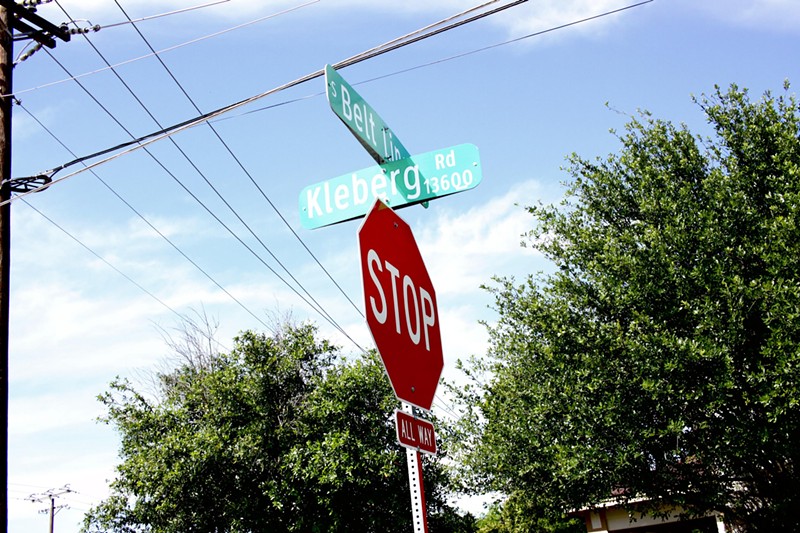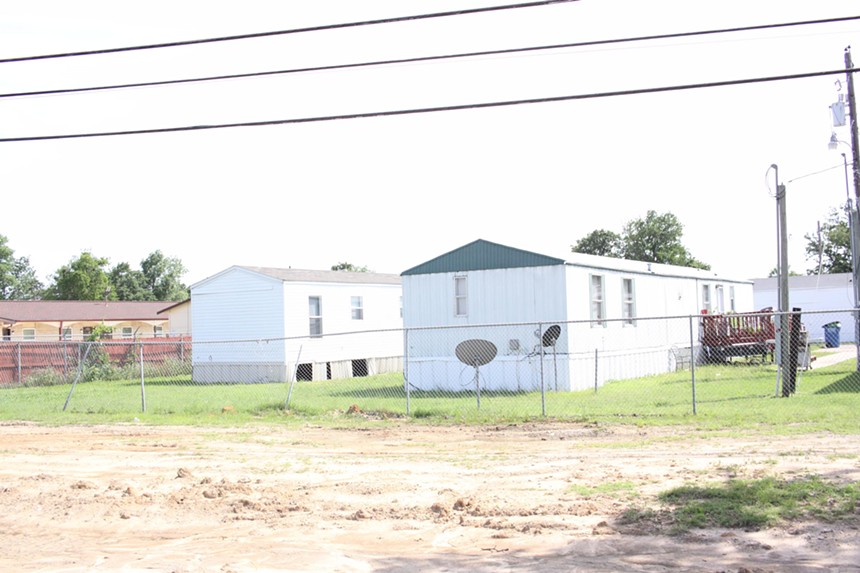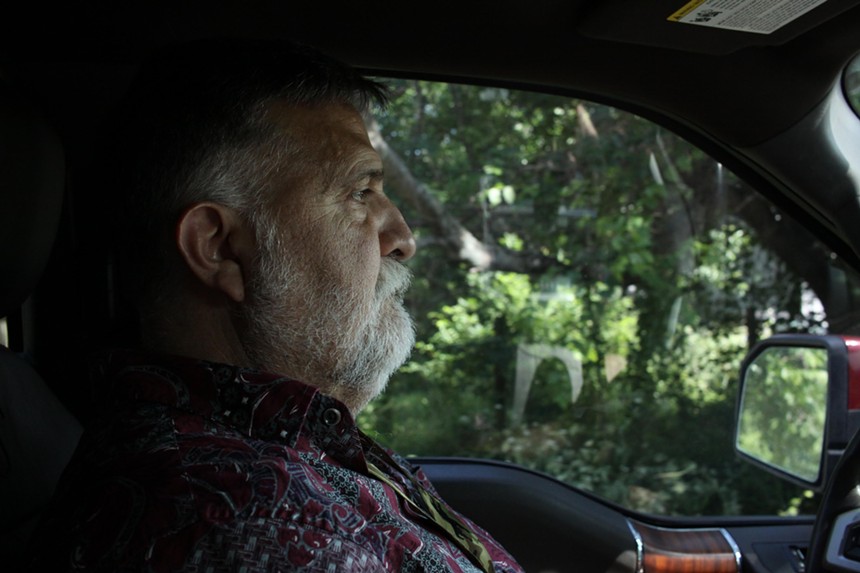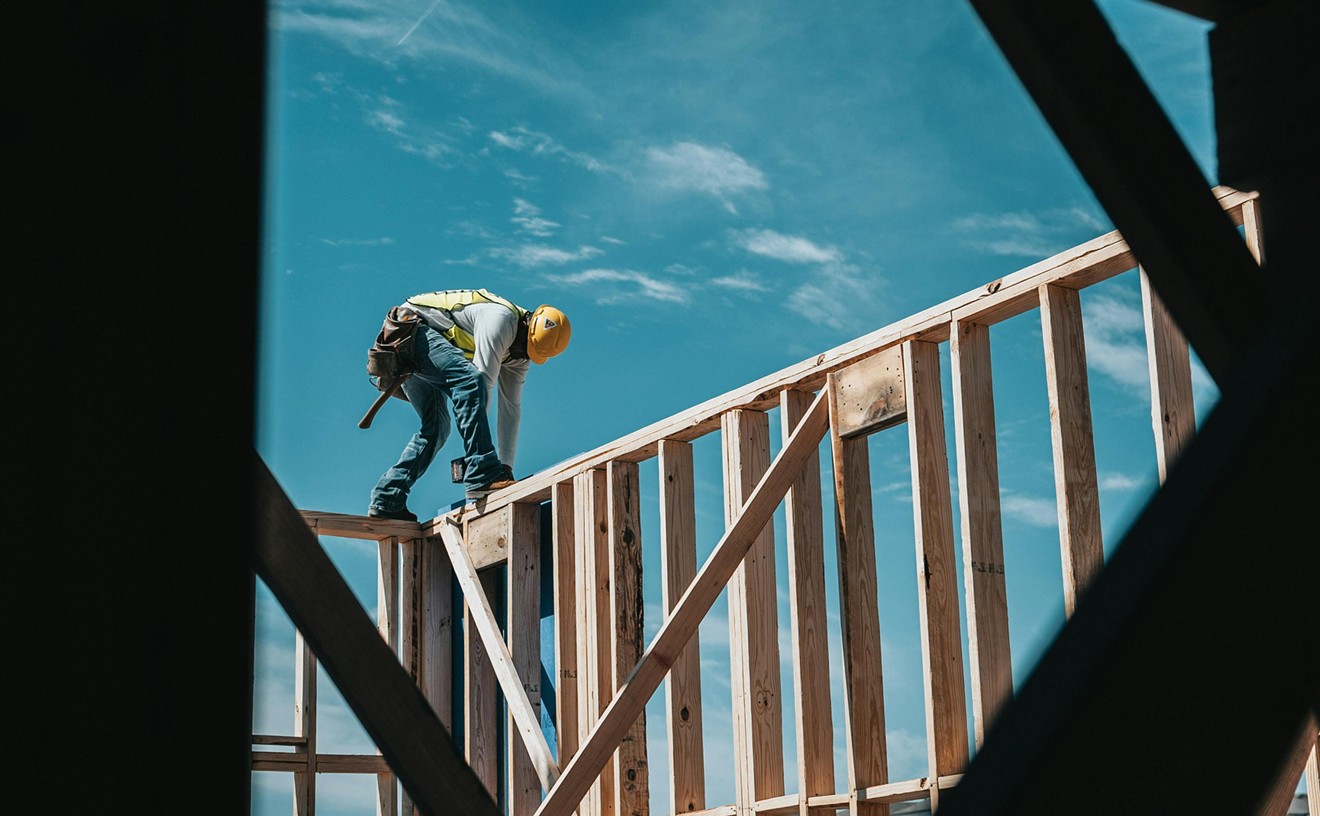A drive around Kleberg-Rylie reveals lots of mobile homes — some fixed up, some breaking down, along with single-family houses and ranches with cows, chickens and horses. It’s a rural part of town with big development creeping toward its doorstep. Some of the residents have been there long enough to see the changes take place. Theodore Wojtowicz, 72, moved to Kleberg-Rylie in 1989 when it most of it was open fields.
If you stay late enough, you’ll hear gunshots, the group says. Some of them even sound like automatic weapons. But it’s hard to get anyone out to the community to do anything about it — just one of the many issues facing Kleberg-Rylie today.
History of Kleberg-Rylie
Kleberg-Rylie is just south of Balch Springs, southeast of the intersection of Lyndon B. Johnson Freeway and U.S. Highway 175. According to the city of Dallas, Kleberg-Rylie dates back to the 1840s when it was on its own as a farming community. It boomed after the Texas Trunk Railroad made Kleberg a stop in the 1880s. It was platted in 1899 and later served as a home to people attempting to build locks on the Trinity River. The community’s population varied from a few hundred during most of its existence to over 4,500 just before being annexed by Dallas.The town was incorporated in 1956, when it started providing water and fire protection to its residents. At the time, it was the largest town in the state without a property tax. But increased rates for electricity and other services crippled the town, leaving it faced with the possibility of consolidation or annexation.
In October 1977 the mayor of the town voiced his support for consolidation and it was put to the voters the following year. The final tally was 559 people in favor and 342 against merging with Dallas. Kleberg-Rylie was officially annexed in April 1978. Back then the town had a mostly white population. These days, it's made up mostly of Hispanic, Black and Native American residents.
Resident Concerns
Wojtowicz moved in 11 years after Kleberg-Rylie became a part of Dallas. He’s a utility contractor who wanted some land to store his machinery on. He started with 20 acres and today has about 13. “It’s a lot to take care of for me,” he said. “I’m getting older.”Many problems face Kleberg-Rylie these days. The roads are bad. Police response and code enforcement take too long. It’s a site for illegal dumping. Some parts of Kleberg-Rylie are still use septic tanks. There are illegal businesses there, residents say, and the community has seemingly been forgotten. But Wojtowicz is there to stay. “We made it ours,” he said. “We made life work here.”
He added that Kleberg-Rylie is a tight-knit community. “All my neighbors, I get along with really good,” he said. “I don’t have any problems. In fact, we’ve said if there’s problems, call me, I’ll come back you up, you know, if you got a criminal or something there, because the cops take too long to get there.”
Wojtowicz is hoping that as the area becomes more developed the city will decide to put a police substation there so response times can be quicker.
He said one of the worst things about Kleberg-Rylie is the roads, and they’re not getting any better — even with more development. “They’re building houses to meet demand and they’re not building the roads to meet the traffic they’re going to be loaded with,” Wojtowicz said. “In fact, the roads are so bad, you’ve got to drive at 20 miles an hour on some of them or you’re going to wreck your undercarriage.”
Wojtowicz and others in the community also believe there are too many mobile homes in Kleberg-Rylie. Some locals estimate that 85% of the mobile homes in Dallas County are in Kleberg-Rylie, although the Observer can't confirm that figure. Wojtowicz said these homes don’t count as traditional rooftops when developers consider building stores or other businesses, so they never get built there. Residents must currently travel far from the community to get to a restaurant or a supermarket.
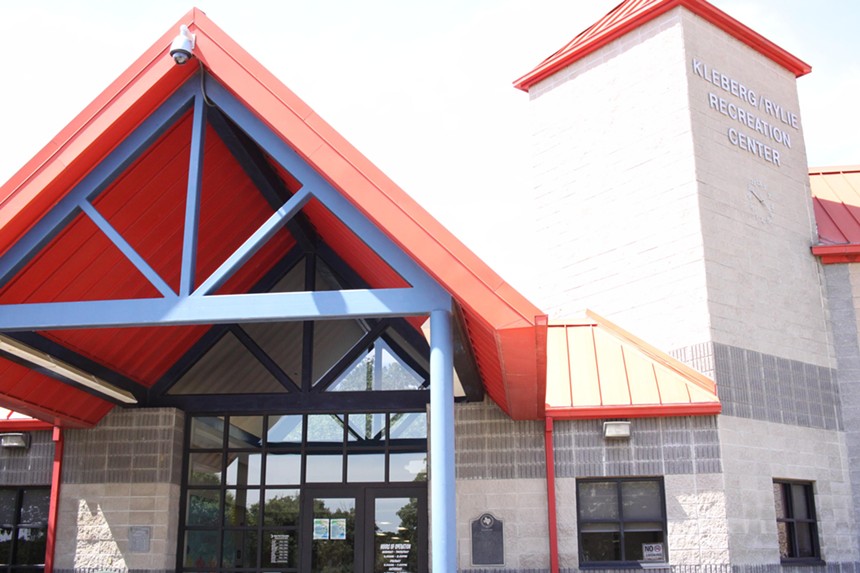
Half of the gym at the Kleberg-Rylie Recreation Center is closed because the floor is damaged.
Jacob Vaughn
Freeman said he’s lived in Kleberg-Rylie for decades. His house is 104 years old and was owned by the last mayor of Kleberg before the community was annexed. “We just love it out here,” Freedman said. “This is our home, our community.”
He used to own a little weekly newspaper called the Suburban Tribune that would cover all the happenings in Kleberg-Rylie and the surrounding area. The publication could sometimes build momentum around getting things done in the community.
As Freeman and Wojtowicz saw the area developing, they decided to form a coalition to help advocate for the community. They stopped a sewage plant and an airport from being built in the years they were active. Most recently, they stopped a batch plant from setting up shop on Kleberg Road.
“Life’s experiences show you that if you don’t speak up, nothing gets done,” Freeman said.
Wojtowicz first got heavily involved in the community when a new trailer park was proposed for land behind his house. He got about 100 people to sign a petition against it. He also had a lot of residents put signs in their yards that said “No more [mobile home parks],” so that when City Council members came out to see the proposed site, they’d see all the opposition to the mobile home development. Wojtowicz said. “I won the war,” Wojtowicz said. “I stopped them.”“This is our home, our community.” – Bill Freeman, Kleberg-Rylie resident
tweet this
Now, there are traditional homes behind his plot of land.
Issues like this are what got Wojtowicz and Freeman involved in advocating for the community in the first place. “That’s what kind of pulled us all together in the beginning was having a little bit of a say about what went where and what the quality of it was,” Freeman said.
Passing the Torch
Now that they’re getting older, Freeman and Wojtowicz are relying on people like Jessica Ramirez, 30, and David Carranza, 60, to carry the torch.Ramirez, who lives in a mobile home, doesn’t want any more trailer parks in the community either. “Mainly, the big reason is, it’s a private owned sector,” she said of the parks. “So, they make the money. They own the property. We just pay rent. It’s not a good type of housing, I would say. It’s a transitional housing.”
She said she stays in Kleberg-Rylie partly because she feels she doesn’t have the means to leave. “My parents moved back to Mesquite and I stayed because there’s no way for me to get out, if that makes sense,” she said. “They keep raising the rent.”
She added: “We don’t want any more mobile homes being placed there because of this private sector that’s all gain but nothing for us.”
Carranza, president of the Kleberg Neighborhood Association and Crime Watch, said development has been creeping toward Kleberg-Rylie’s doorstep for years now and it’s only getting worse. He wouldn’t mind it so much if the city did some work on the community’s infrastructure so that it could support all this growth. “It is chaotic, but they’re not making the road stronger,” he said.
There are also few sidewalks in the community, leaving residents to walk in the street. “Putting all this stuff into Kleberg and not giving us economic development is a big thing,” Ramirez said. “It’s just not fair.”
Carranza said a lot of the mobile homes in Kleberg-Rylie are falling apart because homeowners don’t have the money to fix them up. He thinks the city has programs to help traditional homeowners with concerns like this, but nothing specifically for mobile home owners. “The city has nothing for them,” Carranza said. “It’s sad. They’re keeping these people down because they’re in a mobile home.”
Ramirez said many Kleberg-Rylie residents have lost hope.
“They’re not saying anything and they’re not speaking up because they just feel like there’s no point,” she said. “They feel like they don’t matter, and Dallas has done a good job of making them feel that way, making it seem like they don’t matter.”
Monica Guardado, 48, doesn’t live in Kleberg-Rylie but she owns land there that once belonged to her father, who died about a year and a half ago. She's now speaking up for her late father. “People here have been neglected, misused and mistreated,” she said of Kleberg-Rylie residents.“It’s just not fair.” – Jessica Ramirez, Kleberg-Rylie resident
tweet this
Because her father’s land is in a flood plain, she can’t build on it without jumping through a few hoops. She said before her father died, a homeless encampment on city property spilled over onto his land. He called code enforcement. He called the police. But both said they couldn’t do anything. “Even though they came out, I’m still told that because it’s private property, it’s my job to clean it,” Guardado said before adding that it took a lot of fighting to get the homeless off her father’s land.
“I think people here are very hopeless, and I think they just wait for a miracle to happen,” she said. “I know I do.”
She and the others wonder why their council member Tennell Atkins doesn’t do more to advocate for Kleberg-Rylie. “It just makes me so mad,” Guardado said. “Why can’t the people here get the same treatment? It’s equal. They live here. They pay taxes. They pay bills. What’s the problem? No one wants to outreach and come help and it’s sad.”
Her employer, 83-year-old Marcus Wood, has advocated for Kleberg-Rylie for some time now. He tells her when he’s gone, she’ll have to keep up the good fight for the community.
Carranza is on one of the steering committees for ForwardDallas, the city’s latest comprehensive land-use plan that’s still in the works. There are plans for Kleberg-Rylie in ForwardDallas that seem promising, but Carranza worries these plans will only be forgotten like previous plans for the community.
Carranza moved to Kleberg from Oak Cliff about four years ago to get away from the city life. He likes that Kleberg-Rylie is more rural and hopes it stays that way. “It’s just so peaceful,” he said of the community. “It’s like a whole different thing. That’s why I got involved.”
Upon getting involved, he met longtime residents like Freeman and Wojtowicz. “I started getting pissed off,” he said. “These people have been fighting for 20 years and they’re getting older.”
One thing Kleberg-Rylie residents are trying to do is get a trail running through the community. “This trail has been on the plans since 2007,” Carranza said, but it has yet to be built.
The residents, at least in part, blame their city leadership.
Advocating for Kleberg-Rylie has essentially become a full-time job for Carranza. He said he’s been an activist since he was a kid. These days, his cause is the betterment of Kleberg-Rylie. “This is my mission now because I can’t have him [Freeman] be around and not see things happen,” he said. “I mean, this is ridiculous. It has to happen. Things have to start happening. We have a beautiful area out here, but the city’s allowed it to be ruined.”
City Council Member Responds
Atkins says he is just as frustrated about the issues facing the community, and he defended his leadership passionately. He also had his office send a plethora of fliers to Kleberg residents about various events he’s held in the community over the last few months.Atkins said he just cannot please everyone in the Kleberg-Rylie community. “I spend a majority of my time in Kleberg-Rylie because it’s a rural area,” he said.
According to the council member, apartments have been placed in the community, some streets have been repaired and the rec center has been redone since he was elected. Half of the gym at the rec center is closed because the floor is damaged, but Atkins said the city just recently found the funds to get it fixed.
He said he’s brought the police chief and fire chief out to the community, as well as code enforcement. He’s held community meetings there about the budget, the 2024 bond package and ForwardDallas. He said he’s done a lot for Kleberg-Rylie over the last 15–20 years. “Is Kleberg-Rylie better off than when I started? Yes,” he said. “I’ve got passion for Kleberg-Rylie because No. 1, all they’ve got out there’s a rec center.”
He said it’s just the small group of people we spoke to who are complaining about his leadership. “And I wish the Dallas Observer would come to my town hall meetings. Then you’ll know what’s going on in Kleberg-Rylie,” he said.
He said he’s put millions of dollars into the community but he has 53 square miles in his district to watch out for. “I get $25 million for infrastructure,” he said. “Everybody [on council] gets $25 million, and I’ve got 53 square miles and some have 10 square miles.” At this rate, he said, “I’ll never catch up with equity.”
"I’ll be darned if someone says I don’t represent Kleberg-Rylie.” – Dallas City Council member Tennell Atkins
tweet this
He said he can’t do anything about the lack of restaurants and shops in the area because developers go where they want and they’re not ready to be in Kleberg-Riley for one reason or another. But he said he’s always done what he could for the community. “I’m very passionate about Kleberg,” he said. “When I first ran back in 2007, I spent 90% of my time in Kleberg-Rylie because they feel like they did not have a council member representing them. I’ll be darned if someone says I don’t represent Kleberg-Rylie.”
He said he wishes the city would give him more money for infrastructure in his district. Maybe then, he could bring more fixes to the community. “They’re still on septic tanks out there,” he said. “But I don’t have the money. I use what they give me. … It’s a rural area. It’s very difficult but I do not have enough resources.”
Atkins said he wishes people in Kleberg-Rylie would go downtown and tell the City Council what they need. Better yet, they can stop by his District 8 office, he said. “Kleberg-Rylie is my No. 1 priority. It’s always been my No. 1 priority,” he said.
The community needs more resources, but so does the rest of his district. “We could send all the code officers in the city of Dallas out there and you still won’t resolve all the problems,” he said.
Atkins said he does what he can to resolve issues in the community when they’re brought to his attention.
“People who call me, we respond, especially in Kleberg-Rylie because we know they feel like the stepchild to the city of Dallas,” Atkins said. “But, like I said, I cannot make everybody happy in Kleberg-Rylie.”
Carranza said he’s toyed with the idea of running for City Council to represent the community, but he’s not quite ready yet.
“I’m just learning all of this stuff now,” he said. “But if someone doesn’t come in this next time that is going to work with this community, then I feel like I have no choice but to do something.”

